Research Report: Caffeine's Effects on Cycling Performance and Dosage
VerifiedAdded on 2023/05/28
|6
|1204
|466
Report
AI Summary
This report presents research on the effects of caffeine on cycling performance, focusing on a scenario where a cyclist seeks to improve their time trial results. The research formulates an answerable question exploring caffeine's impact and dose dependency. A PICO chart is developed to guide the database search, and the report analyzes relevant databases, revealing a positive correlation between caffeine intake and enhanced performance, potentially through mental stimulation and glycogen sparing effects. The reflection section discusses how caffeine may break down fats, providing cyclists with more carbohydrates for extended use. References to supporting literature are also included.
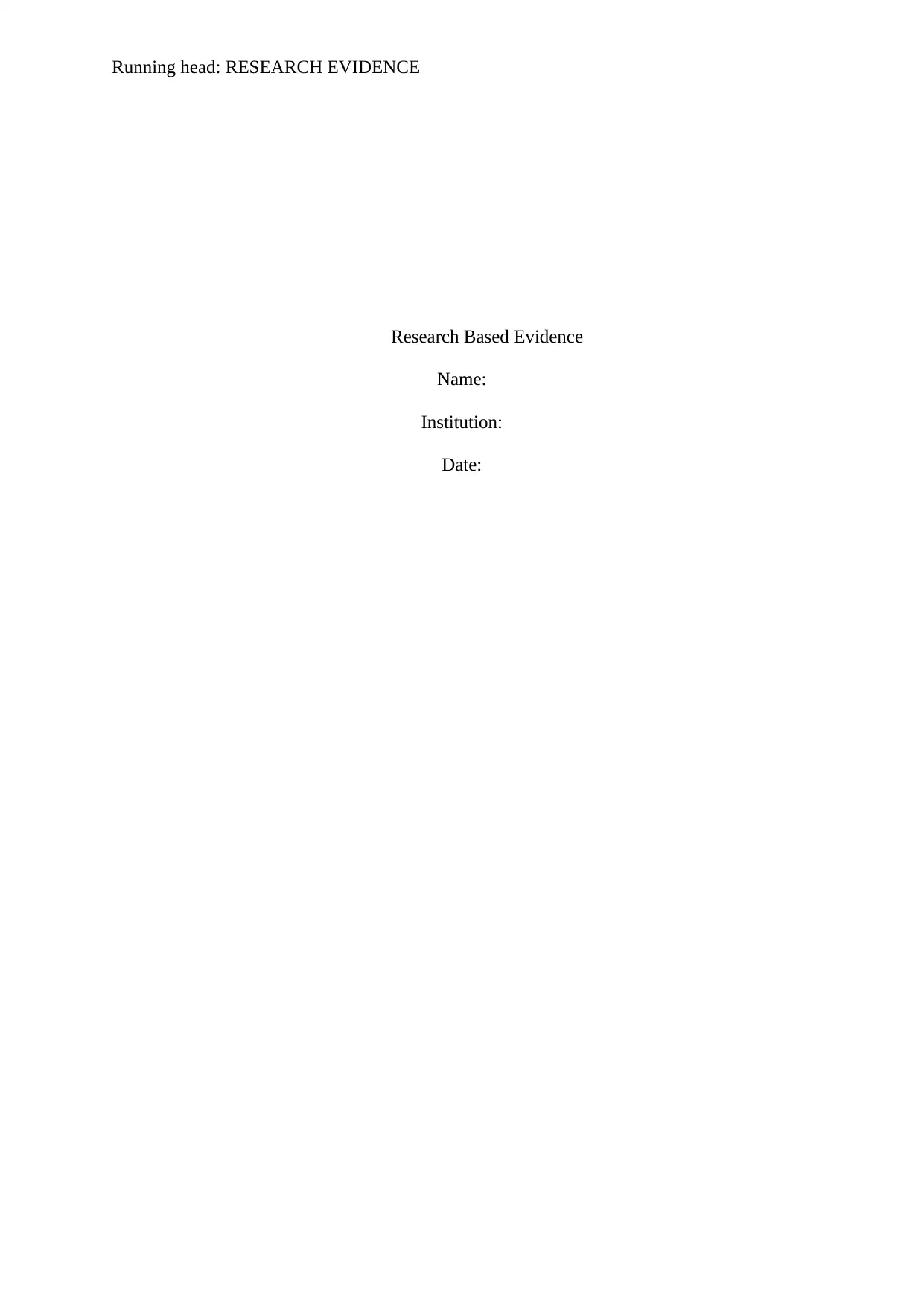
Running head: RESEARCH EVIDENCE
Research Based Evidence
Name:
Institution:
Date:
Research Based Evidence
Name:
Institution:
Date:
Paraphrase This Document
Need a fresh take? Get an instant paraphrase of this document with our AI Paraphraser
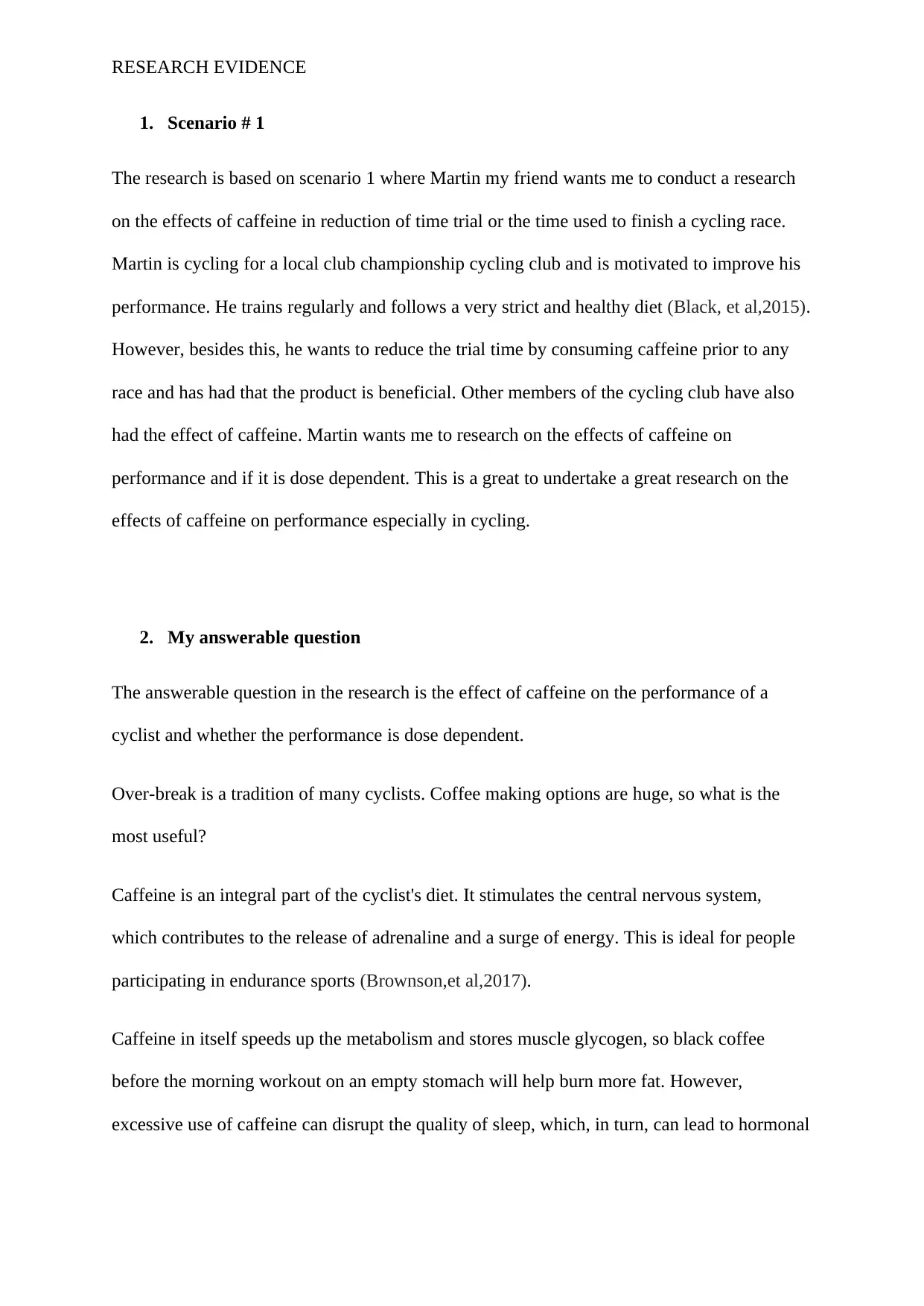
RESEARCH EVIDENCE
1. Scenario # 1
The research is based on scenario 1 where Martin my friend wants me to conduct a research
on the effects of caffeine in reduction of time trial or the time used to finish a cycling race.
Martin is cycling for a local club championship cycling club and is motivated to improve his
performance. He trains regularly and follows a very strict and healthy diet (Black, et al,2015).
However, besides this, he wants to reduce the trial time by consuming caffeine prior to any
race and has had that the product is beneficial. Other members of the cycling club have also
had the effect of caffeine. Martin wants me to research on the effects of caffeine on
performance and if it is dose dependent. This is a great to undertake a great research on the
effects of caffeine on performance especially in cycling.
2. My answerable question
The answerable question in the research is the effect of caffeine on the performance of a
cyclist and whether the performance is dose dependent.
Over-break is a tradition of many cyclists. Coffee making options are huge, so what is the
most useful?
Caffeine is an integral part of the cyclist's diet. It stimulates the central nervous system,
which contributes to the release of adrenaline and a surge of energy. This is ideal for people
participating in endurance sports (Brownson,et al,2017).
Caffeine in itself speeds up the metabolism and stores muscle glycogen, so black coffee
before the morning workout on an empty stomach will help burn more fat. However,
excessive use of caffeine can disrupt the quality of sleep, which, in turn, can lead to hormonal
1. Scenario # 1
The research is based on scenario 1 where Martin my friend wants me to conduct a research
on the effects of caffeine in reduction of time trial or the time used to finish a cycling race.
Martin is cycling for a local club championship cycling club and is motivated to improve his
performance. He trains regularly and follows a very strict and healthy diet (Black, et al,2015).
However, besides this, he wants to reduce the trial time by consuming caffeine prior to any
race and has had that the product is beneficial. Other members of the cycling club have also
had the effect of caffeine. Martin wants me to research on the effects of caffeine on
performance and if it is dose dependent. This is a great to undertake a great research on the
effects of caffeine on performance especially in cycling.
2. My answerable question
The answerable question in the research is the effect of caffeine on the performance of a
cyclist and whether the performance is dose dependent.
Over-break is a tradition of many cyclists. Coffee making options are huge, so what is the
most useful?
Caffeine is an integral part of the cyclist's diet. It stimulates the central nervous system,
which contributes to the release of adrenaline and a surge of energy. This is ideal for people
participating in endurance sports (Brownson,et al,2017).
Caffeine in itself speeds up the metabolism and stores muscle glycogen, so black coffee
before the morning workout on an empty stomach will help burn more fat. However,
excessive use of caffeine can disrupt the quality of sleep, which, in turn, can lead to hormonal
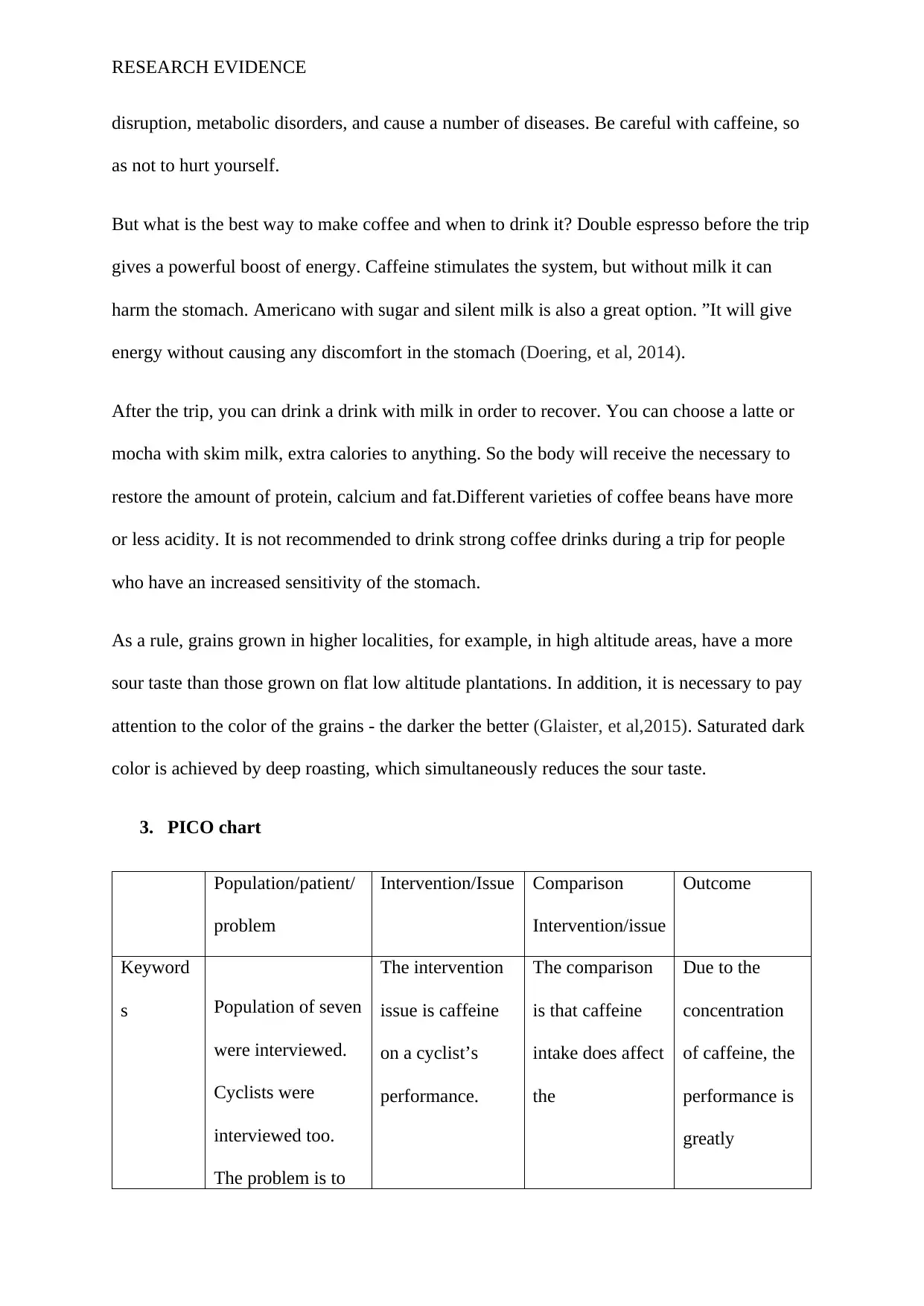
RESEARCH EVIDENCE
disruption, metabolic disorders, and cause a number of diseases. Be careful with caffeine, so
as not to hurt yourself.
But what is the best way to make coffee and when to drink it? Double espresso before the trip
gives a powerful boost of energy. Caffeine stimulates the system, but without milk it can
harm the stomach. Americano with sugar and silent milk is also a great option. ”It will give
energy without causing any discomfort in the stomach (Doering, et al, 2014).
After the trip, you can drink a drink with milk in order to recover. You can choose a latte or
mocha with skim milk, extra calories to anything. So the body will receive the necessary to
restore the amount of protein, calcium and fat.Different varieties of coffee beans have more
or less acidity. It is not recommended to drink strong coffee drinks during a trip for people
who have an increased sensitivity of the stomach.
As a rule, grains grown in higher localities, for example, in high altitude areas, have a more
sour taste than those grown on flat low altitude plantations. In addition, it is necessary to pay
attention to the color of the grains - the darker the better (Glaister, et al,2015). Saturated dark
color is achieved by deep roasting, which simultaneously reduces the sour taste.
3. PICO chart
Population/patient/
problem
Intervention/Issue Comparison
Intervention/issue
Outcome
Keyword
s Population of seven
were interviewed.
Cyclists were
interviewed too.
The problem is to
The intervention
issue is caffeine
on a cyclist’s
performance.
The comparison
is that caffeine
intake does affect
the
Due to the
concentration
of caffeine, the
performance is
greatly
disruption, metabolic disorders, and cause a number of diseases. Be careful with caffeine, so
as not to hurt yourself.
But what is the best way to make coffee and when to drink it? Double espresso before the trip
gives a powerful boost of energy. Caffeine stimulates the system, but without milk it can
harm the stomach. Americano with sugar and silent milk is also a great option. ”It will give
energy without causing any discomfort in the stomach (Doering, et al, 2014).
After the trip, you can drink a drink with milk in order to recover. You can choose a latte or
mocha with skim milk, extra calories to anything. So the body will receive the necessary to
restore the amount of protein, calcium and fat.Different varieties of coffee beans have more
or less acidity. It is not recommended to drink strong coffee drinks during a trip for people
who have an increased sensitivity of the stomach.
As a rule, grains grown in higher localities, for example, in high altitude areas, have a more
sour taste than those grown on flat low altitude plantations. In addition, it is necessary to pay
attention to the color of the grains - the darker the better (Glaister, et al,2015). Saturated dark
color is achieved by deep roasting, which simultaneously reduces the sour taste.
3. PICO chart
Population/patient/
problem
Intervention/Issue Comparison
Intervention/issue
Outcome
Keyword
s Population of seven
were interviewed.
Cyclists were
interviewed too.
The problem is to
The intervention
issue is caffeine
on a cyclist’s
performance.
The comparison
is that caffeine
intake does affect
the
Due to the
concentration
of caffeine, the
performance is
greatly
⊘ This is a preview!⊘
Do you want full access?
Subscribe today to unlock all pages.

Trusted by 1+ million students worldwide
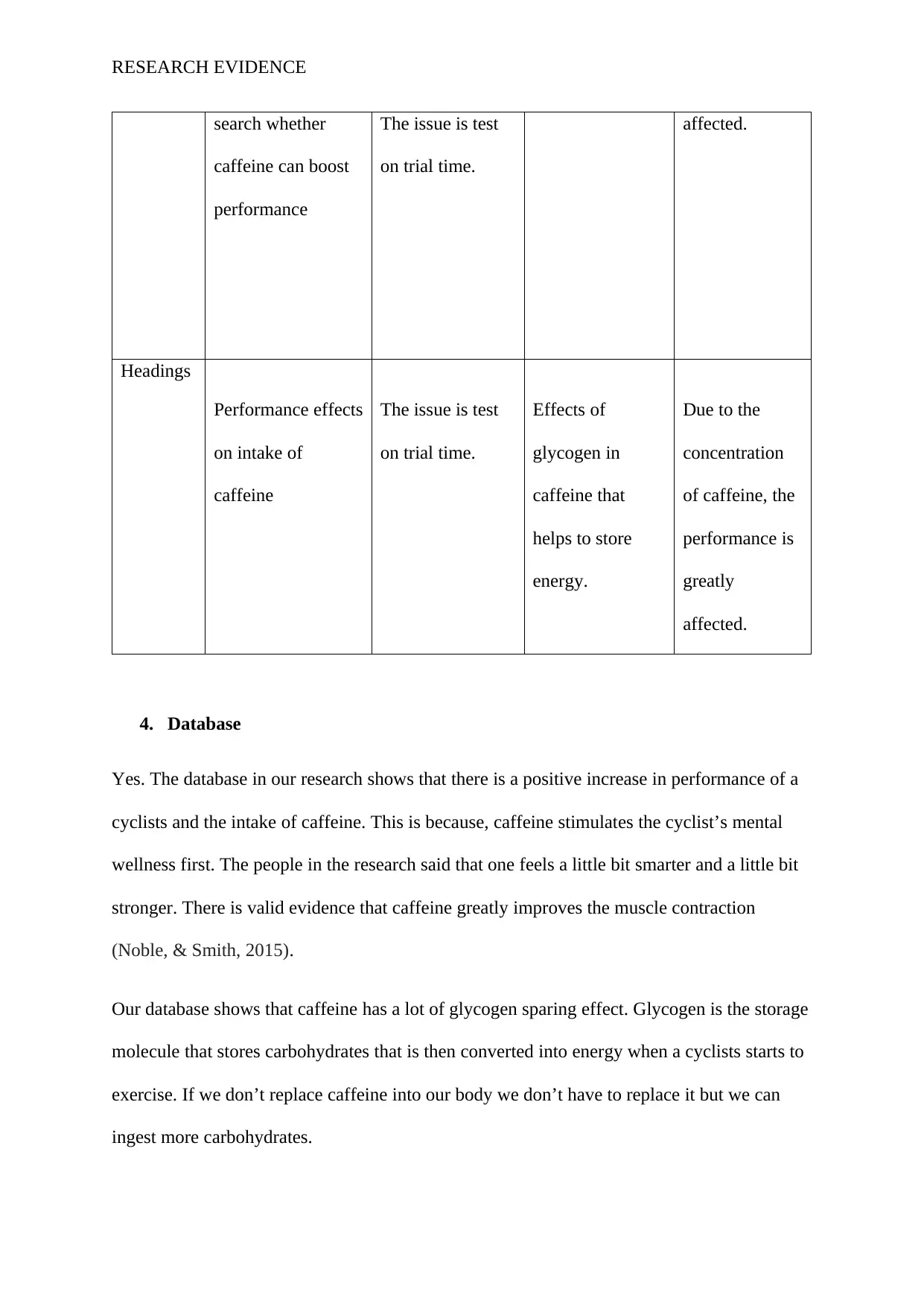
RESEARCH EVIDENCE
search whether
caffeine can boost
performance
The issue is test
on trial time.
affected.
Headings
Performance effects
on intake of
caffeine
The issue is test
on trial time.
Effects of
glycogen in
caffeine that
helps to store
energy.
Due to the
concentration
of caffeine, the
performance is
greatly
affected.
4. Database
Yes. The database in our research shows that there is a positive increase in performance of a
cyclists and the intake of caffeine. This is because, caffeine stimulates the cyclist’s mental
wellness first. The people in the research said that one feels a little bit smarter and a little bit
stronger. There is valid evidence that caffeine greatly improves the muscle contraction
(Noble, & Smith, 2015).
Our database shows that caffeine has a lot of glycogen sparing effect. Glycogen is the storage
molecule that stores carbohydrates that is then converted into energy when a cyclists starts to
exercise. If we don’t replace caffeine into our body we don’t have to replace it but we can
ingest more carbohydrates.
search whether
caffeine can boost
performance
The issue is test
on trial time.
affected.
Headings
Performance effects
on intake of
caffeine
The issue is test
on trial time.
Effects of
glycogen in
caffeine that
helps to store
energy.
Due to the
concentration
of caffeine, the
performance is
greatly
affected.
4. Database
Yes. The database in our research shows that there is a positive increase in performance of a
cyclists and the intake of caffeine. This is because, caffeine stimulates the cyclist’s mental
wellness first. The people in the research said that one feels a little bit smarter and a little bit
stronger. There is valid evidence that caffeine greatly improves the muscle contraction
(Noble, & Smith, 2015).
Our database shows that caffeine has a lot of glycogen sparing effect. Glycogen is the storage
molecule that stores carbohydrates that is then converted into energy when a cyclists starts to
exercise. If we don’t replace caffeine into our body we don’t have to replace it but we can
ingest more carbohydrates.
Paraphrase This Document
Need a fresh take? Get an instant paraphrase of this document with our AI Paraphraser
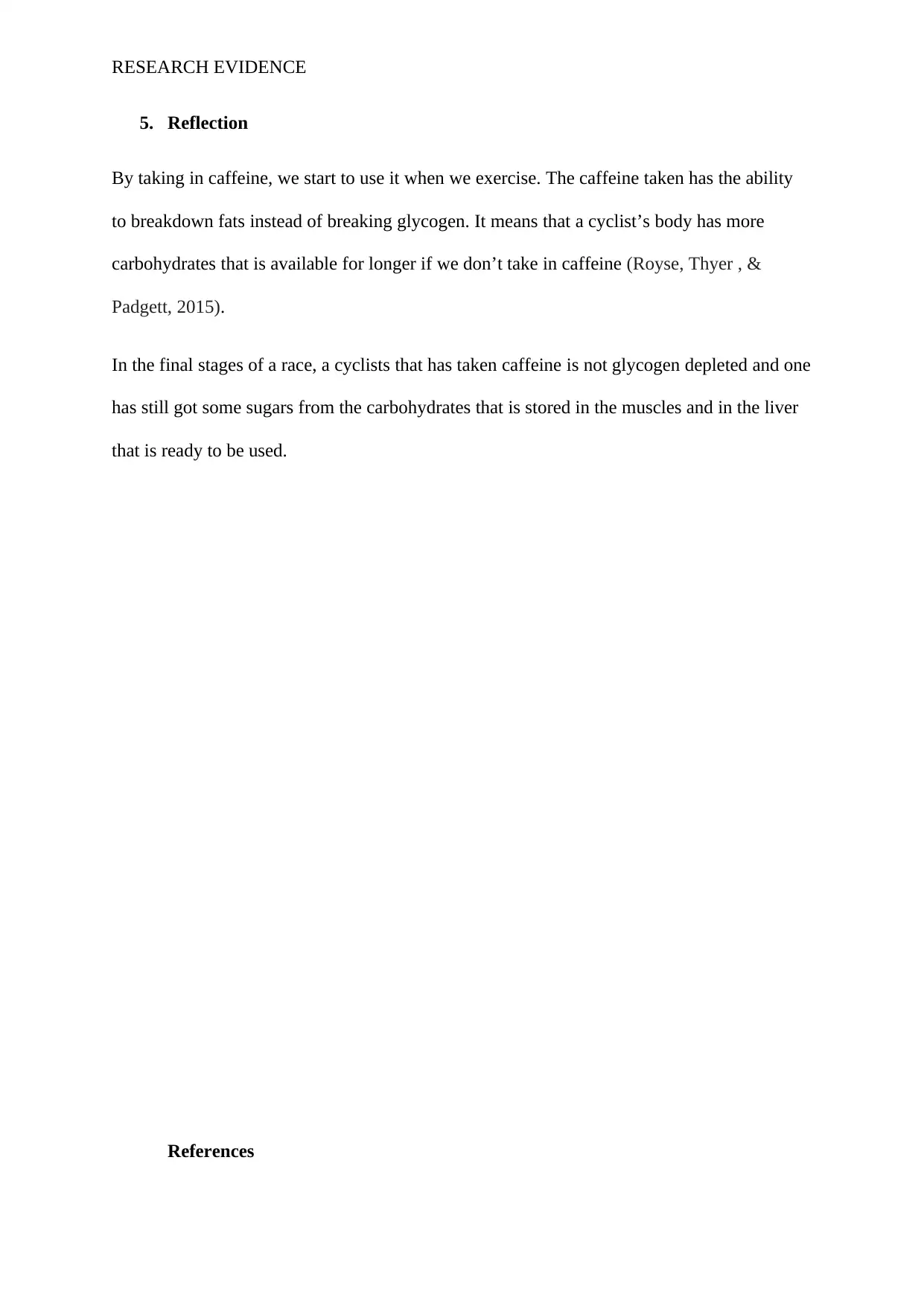
RESEARCH EVIDENCE
5. Reflection
By taking in caffeine, we start to use it when we exercise. The caffeine taken has the ability
to breakdown fats instead of breaking glycogen. It means that a cyclist’s body has more
carbohydrates that is available for longer if we don’t take in caffeine (Royse, Thyer , &
Padgett, 2015).
In the final stages of a race, a cyclists that has taken caffeine is not glycogen depleted and one
has still got some sugars from the carbohydrates that is stored in the muscles and in the liver
that is ready to be used.
References
5. Reflection
By taking in caffeine, we start to use it when we exercise. The caffeine taken has the ability
to breakdown fats instead of breaking glycogen. It means that a cyclist’s body has more
carbohydrates that is available for longer if we don’t take in caffeine (Royse, Thyer , &
Padgett, 2015).
In the final stages of a race, a cyclists that has taken caffeine is not glycogen depleted and one
has still got some sugars from the carbohydrates that is stored in the muscles and in the liver
that is ready to be used.
References
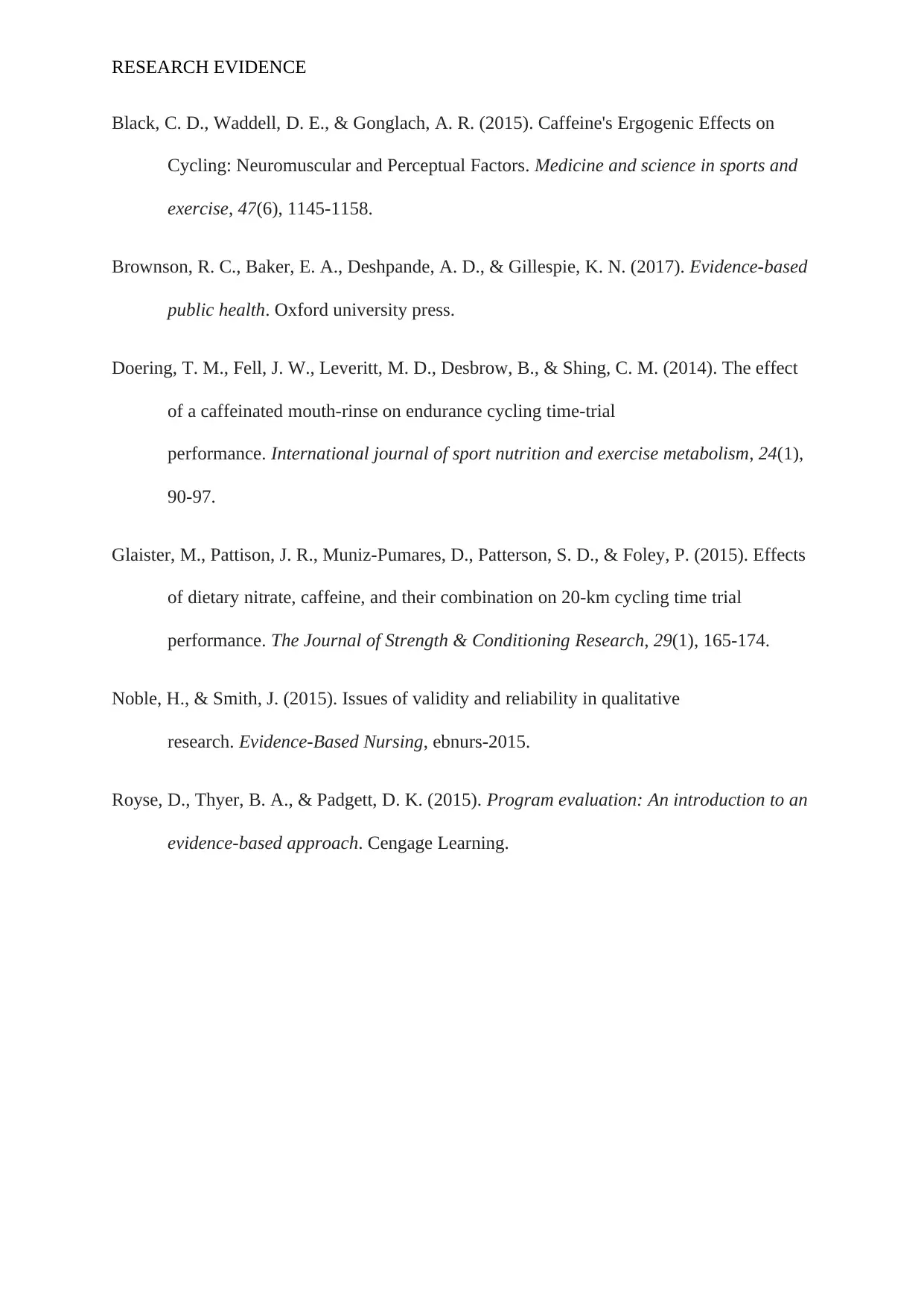
RESEARCH EVIDENCE
Black, C. D., Waddell, D. E., & Gonglach, A. R. (2015). Caffeine's Ergogenic Effects on
Cycling: Neuromuscular and Perceptual Factors. Medicine and science in sports and
exercise, 47(6), 1145-1158.
Brownson, R. C., Baker, E. A., Deshpande, A. D., & Gillespie, K. N. (2017). Evidence-based
public health. Oxford university press.
Doering, T. M., Fell, J. W., Leveritt, M. D., Desbrow, B., & Shing, C. M. (2014). The effect
of a caffeinated mouth-rinse on endurance cycling time-trial
performance. International journal of sport nutrition and exercise metabolism, 24(1),
90-97.
Glaister, M., Pattison, J. R., Muniz-Pumares, D., Patterson, S. D., & Foley, P. (2015). Effects
of dietary nitrate, caffeine, and their combination on 20-km cycling time trial
performance. The Journal of Strength & Conditioning Research, 29(1), 165-174.
Noble, H., & Smith, J. (2015). Issues of validity and reliability in qualitative
research. Evidence-Based Nursing, ebnurs-2015.
Royse, D., Thyer, B. A., & Padgett, D. K. (2015). Program evaluation: An introduction to an
evidence-based approach. Cengage Learning.
Black, C. D., Waddell, D. E., & Gonglach, A. R. (2015). Caffeine's Ergogenic Effects on
Cycling: Neuromuscular and Perceptual Factors. Medicine and science in sports and
exercise, 47(6), 1145-1158.
Brownson, R. C., Baker, E. A., Deshpande, A. D., & Gillespie, K. N. (2017). Evidence-based
public health. Oxford university press.
Doering, T. M., Fell, J. W., Leveritt, M. D., Desbrow, B., & Shing, C. M. (2014). The effect
of a caffeinated mouth-rinse on endurance cycling time-trial
performance. International journal of sport nutrition and exercise metabolism, 24(1),
90-97.
Glaister, M., Pattison, J. R., Muniz-Pumares, D., Patterson, S. D., & Foley, P. (2015). Effects
of dietary nitrate, caffeine, and their combination on 20-km cycling time trial
performance. The Journal of Strength & Conditioning Research, 29(1), 165-174.
Noble, H., & Smith, J. (2015). Issues of validity and reliability in qualitative
research. Evidence-Based Nursing, ebnurs-2015.
Royse, D., Thyer, B. A., & Padgett, D. K. (2015). Program evaluation: An introduction to an
evidence-based approach. Cengage Learning.
⊘ This is a preview!⊘
Do you want full access?
Subscribe today to unlock all pages.

Trusted by 1+ million students worldwide
1 out of 6
Your All-in-One AI-Powered Toolkit for Academic Success.
+13062052269
info@desklib.com
Available 24*7 on WhatsApp / Email
![[object Object]](/_next/static/media/star-bottom.7253800d.svg)
Unlock your academic potential
Copyright © 2020–2025 A2Z Services. All Rights Reserved. Developed and managed by ZUCOL.
